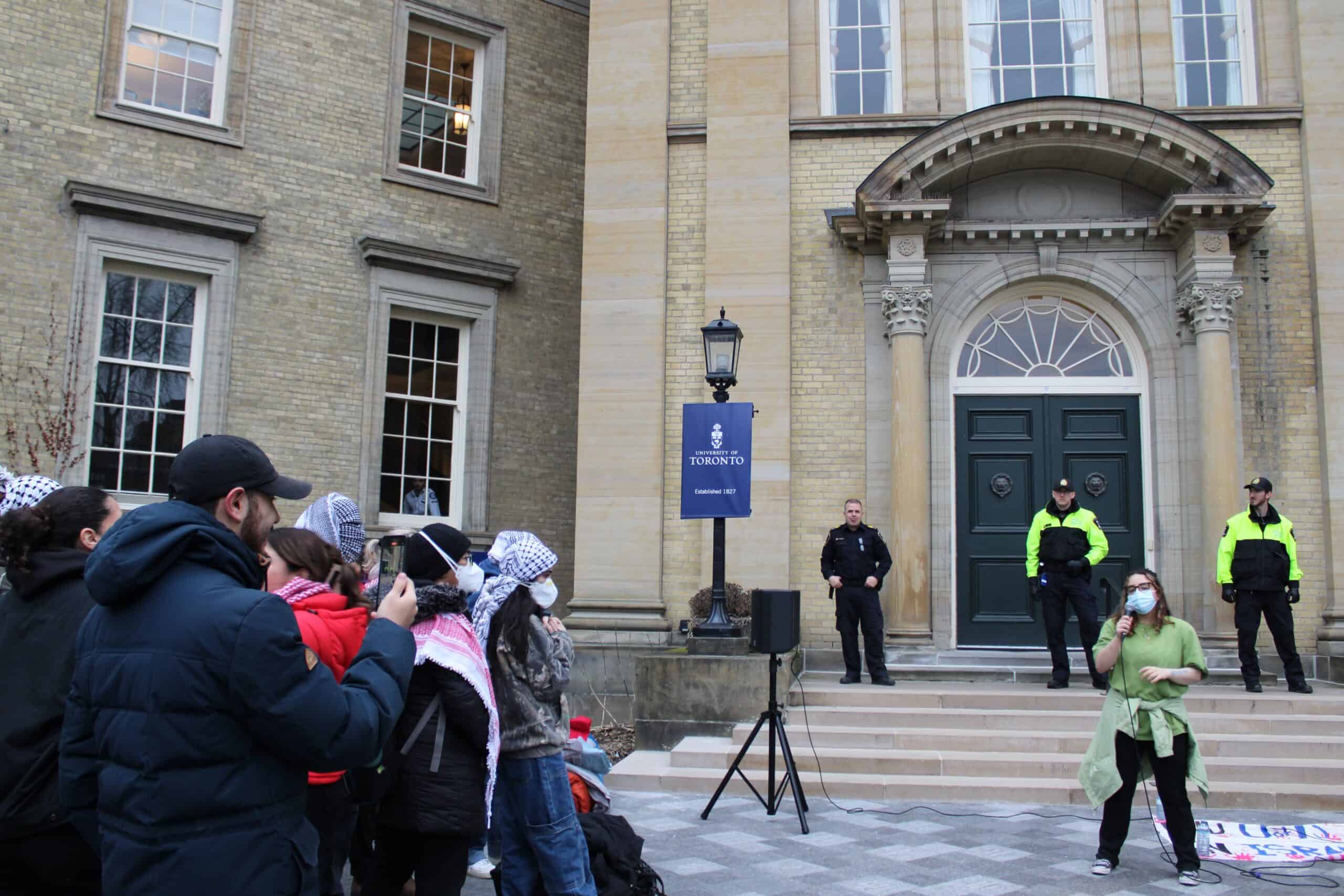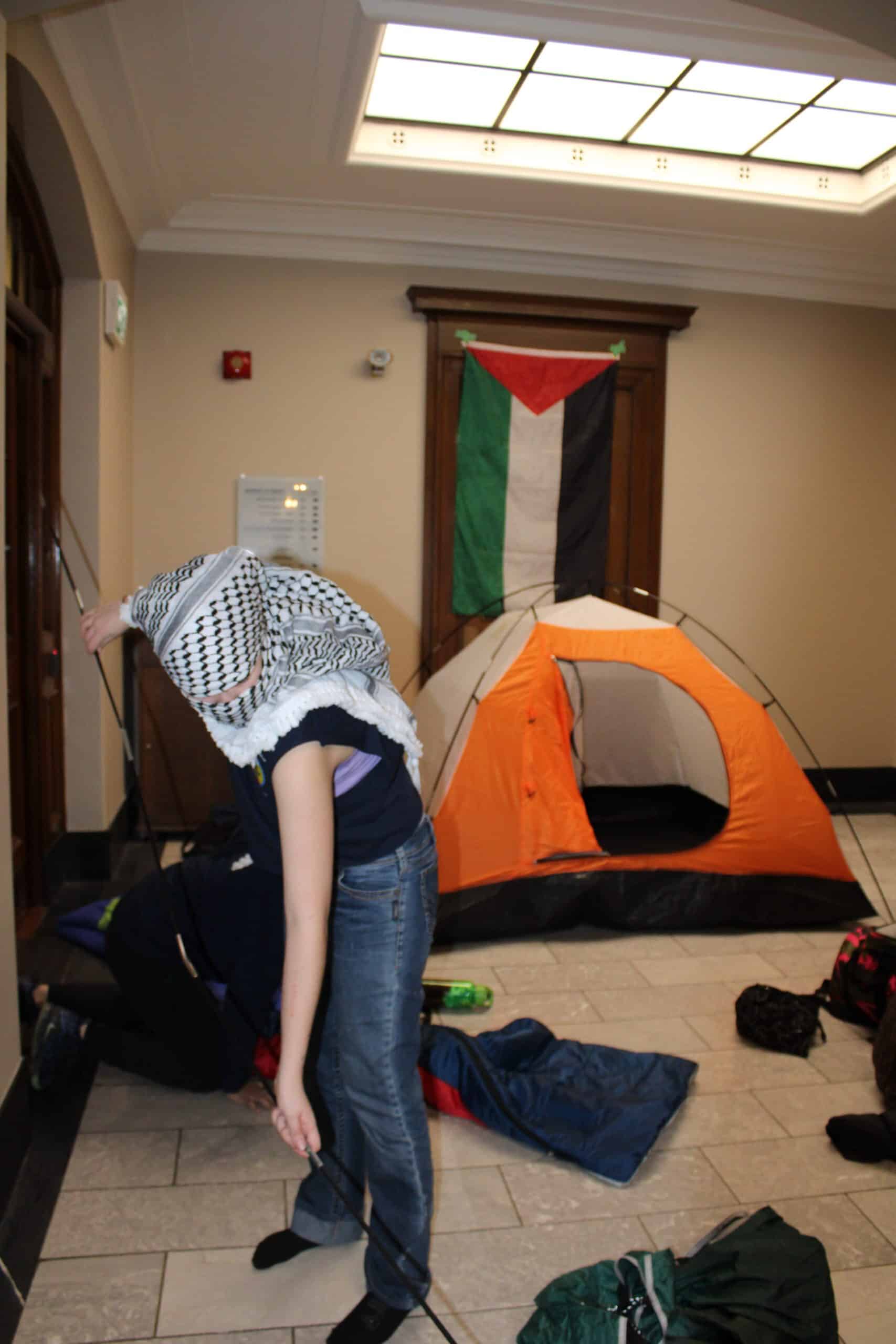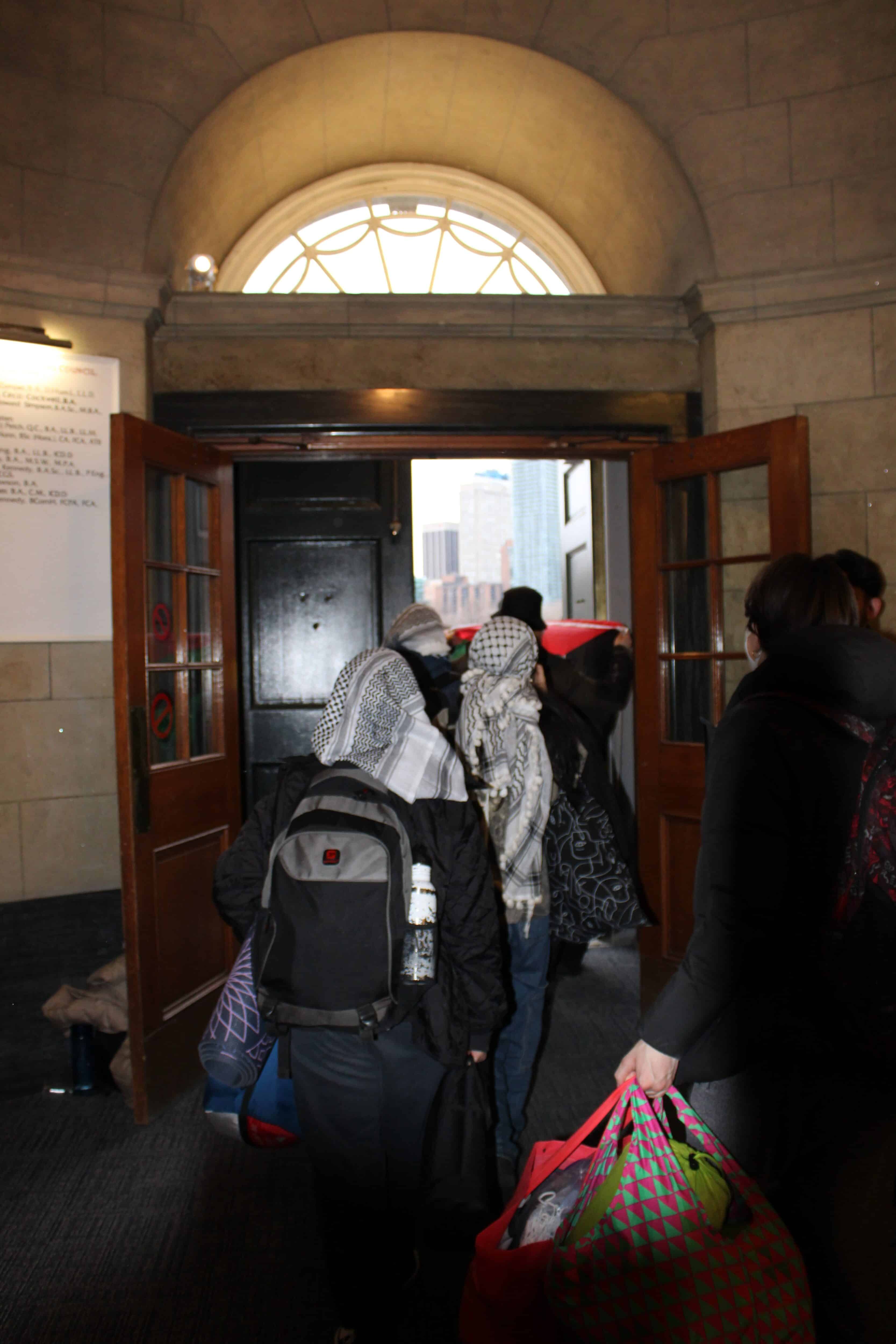Twenty-six hours into a protest staged by students outside of U of T President Meric Gertler’s office, university administrators offered a deal: leave by 6:00 pm, and you can have a meeting with Gertler. Students accepted the offer.
The group of students — operating under the name UofT Occupy for Palestine (O4P) — entered Simcoe Hall on April 1, demanding that U of T divest from companies that provide military goods to the Israeli government, end all partnerships with universities operating in or supporting settlements outside of the internationally recognized Israeli border, and publicly disclose all companies in which the university invests — or, otherwise, that Gertler publicly clarify the university’s stance on their demands.
Following an April 3 meeting with Gertler, the groups slammed the university on Instagram for providing “non-answers” and failing to “meaningfully respond to [O4P’s] demands.” The group awaits athe more detailed response to the group’s demands that the university promised to provide by April 8.
A timeline of the protest
After meeting with university administrators on the afternoon of April 1, 17 students decided to stay in Simcoe Hall overnight, stating that they would not leave until U of T outlined a plan for meeting their demands or until Gertler met with them personally and directly addressed their demands.
Around 2:20 pm on April 2, Vice-Provost, Students Sandy Welsh exited Gertler’s office and told the students that she expected the students to leave the building by 6:00 pm, when Simcoe Hall closes. After the students deliberated, they told Welsh that they would leave if they could guarantee a meeting with President Gertler.
In response, Welsh and Assistant Vice-President, Office of the President and Chief of Protocol Bryn MacPherson drafted a physical letter offering an in-person meeting between Gertler and four representatives of the group at 3:00 pm on April 3. Welsh told the protesters that this meeting would be contingent on the protesters leaving before the 6:00 pm deadline.
After conferring, the student protesters read out a response to Welsh and MacPherson. “We accept your offer and look forward to a substantive conversation to confirm your critical details,” read a representative.
Campus Safety had prohibited food or other supplies from entering the building for students participating in the protest. Officers told students that, if they left, they couldn’t reenter. Campus Safety officers repeatedly turned the lights on and off early in the morning, and a statement posted on the O4P’s Instagram account claims Campus Safety also took pictures of students during the night while they slept.
Officers also refused multiple requests to send supplies to the Varsity reporter covering the protest, and refused to allow reporters to enter the building or re-enter if they were to leave.

One student addresses the crowd gathered for a rally outside of Simcoe. JESSIE SCHWALB/THEVARSITY
In a post on O4P’s Instagram, it called for a rally at 5:00 pm to support the protesters. At the peak of the rally, over 80 people had gathered outside Simcoe Hall to support the protesters. When the students inside exited Simcoe Hall, a cheer went up among the crowd.
Support from the outside
On April 2, the University of Toronto Students’ Union (UTSU) posted a story on its Instagram page expressing support for the protesters and urging people to “come show [their] support.”
The UTSU executive team sent a statement to Gertler expressing their support for O4P and its three demands. The union urged Gertler to meet with the students. “We want to remind you of the urgency of the situation in Gaza and of the importance of divestment from weapons and the occupation at this time,” they wrote.
UTSU Vice-President Public and University Affairs Aidan Thompson told The Varsity that Campus Safety restricting the protesters’ access to food was “completely unacceptable.”
“They are not attacking people, they are peacefully protesting, and sending, effectively, campus police there to respond is not acceptable,” said Thompson. “[U of T] should be responding to their demands, and actually responding to the needs of students rather than trying to police their way out.”
Multiple other groups at the university and beyond, including Health Workers Alliance for Palestine — a national group of healthcare workers; the Canadian Unit of Public Employees Local 3902, which represents contract academic workers across U of T; and student group Climate Justice UofT have also expressed support for the protesters.

Students pack up after agreeing to a deal with university administrators. JESSIE SCHWALB/THEVARSITY
What comes next
Aviral Dhamija — a fourth-year double–majoring in philosophy and international relations and an O4P member — told The Varsity on April 2 that they felt “cautioned elation” exiting Simcoe Hall.
“Getting a physical meeting was massive for us,” they said. Now, they’re looking to have a “good faith” discussion with Gertler. “What I’m not hoping to see [at the meeting] is sympathy and grief and just emotional blanket statements,” they said.
Dhamija said that they hope that U of T takes immediate and concrete steps — like ceasing to renew research partnerships with Israeli universities that provide support to the Israeli military, an action that they suggested Gertler could propose as an agenda item at the April 11 University Affairs Board meeting — that will “place public pressure on other Canadian universities that often look to U of T for guidance.”
They highlighted that, in 2016, the University of Toronto Asset Management corporation — the organization that determines how to manage U of T investments, which totalled $7.7 billion in 2022 — signed the United Nations-supported Principles for Responsible Investment. These principles include considering social factors such as human rights when deciding where to invest. They said they believe the university’s precedent of actions and policies like this should require it to take action on Palestine.
Dhamija said that, if the university does not take steps to address the protesters’ demands, O4P can leverage the support it has received from various groups across the university to continue pushing for change. “If that means that we go back to the streets, then so be it,” they said. “Those connections exist, and they’re not going anywhere.”
After the April 3 meeting, the group posted a statement on Instagram. O4P wrote that the four representatives chosen discussed “U of T’s total inactivity” with Gertler and “were met with non-answers.”
The group claimed that Gertler confirmed that U of T invests in companies that provide the IDF with military goods and services. They also claimed that Gertler denied knowing that every university in Gaza had been destroyed.
According to O4P, Gertler refused to commit to investigating Campus Safety’s actions during the protest, holding a follow-up meeting with the group, or addressing why U of T has not divested from military companies supplying the IDF.
However, the group succeeded in gaining a commitment from President Gertler to reestablish the Anti-Islamophobia Working Ggroup.
O4P asked for people to sign a petition supporting the group’s demands. As of April 7, the petition has approximately 1,850 signatures from U of T students, staff, faculty, and alumni, and approximately 800 signatures from individuals not affiliated with the university.
Editor’s note (April 3): This article has been updated to include comment from Aviral Dhamija and to mention a post by CUPE 3902.
Editor’s note (April 7): This article has been updated to include information about the April 3 meeting between President Gertler and O4P representatives.



No comments to display.